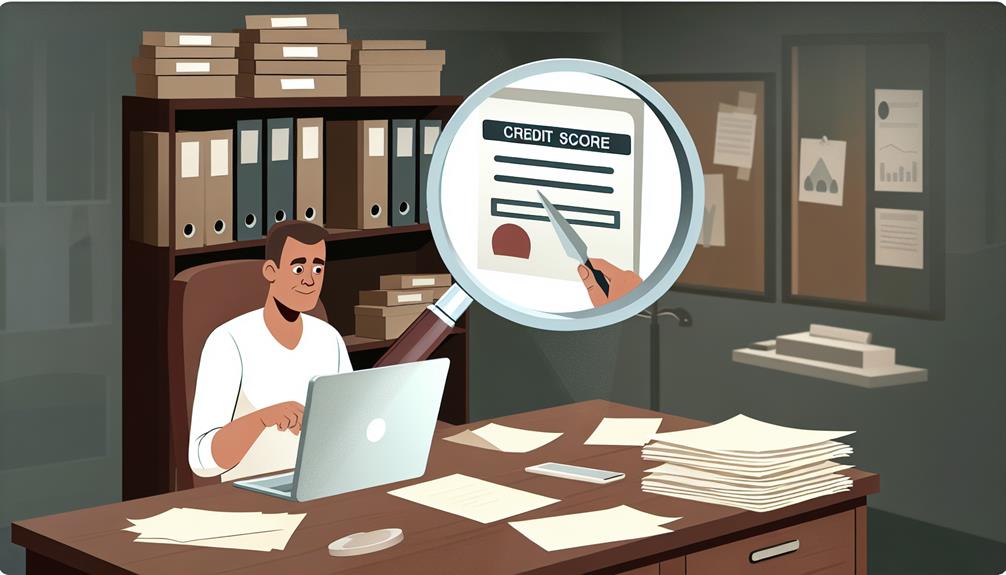As a first-time homebuyer, getting pre-approved for a mortgage requires careful planning and preparation.
Knowing your credit score is crucial, as it significantly affects loan terms and interest rates.
Gather essential documents, including identification, income verification, and financial records.
Research and select the right lender, considering factors like interest rates and fees.
Understand your debt-to-income ratio and work on improving it if necessary.
Save for a down payment and avoid last-minute mistakes, such as taking on new debt or making large purchases.
By following these steps, you'll increase your chances of getting pre-approved for a mortgage.
Know Your Credit Score

Your credit score plays a crucial role in determining the interest rate you'll qualify for and whether you'll be approved for a mortgage. It's essential to understand your credit profile before applying for pre-approval.
One common misconception is that checking your credit score will negatively impact it. However, this is just a myth. Soft inquiries, like checking your own credit score, do not affect your credit.
To better understand your credit profile, it's essential to know the score factors that influence your credit score. There are five key factors: payment history, credit utilization, credit age, credit mix, and new credit. These factors contribute to your overall credit score.
A good credit score typically ranges from 700 to 850. A higher score can lead to better loan terms and lower interest rates.
Gather Essential Documents
To increase your chances of getting pre-approved for a mortgage, assemble a thorough package of necessary documents that lenders require to assess your creditworthiness. A well-organized document checklist helps you stay on track and confirms that you don't miss any vital documents.
| Document | Description |
|---|---|
| Identification | Government-issued ID, passport, or driver's license |
| Income Verification | Pay stubs, W-2 forms, and tax returns |
| Financial Records | Bank statements, investment accounts, and credit reports |
Maintaining a financial diary helps you track your income, expenses, and credit history, making it easier to gather the necessary documents. Having all the required documents in order saves you time and demonstrates your responsibility and creditworthiness to lenders. This preparation increases your chances of getting pre-approved for a mortgage and achieving your dream of homeownership. A meticulous document checklist is key to a smooth mortgage application process.
Choose the Right Lender

Selecting the right lender is crucial in the pre-approval process. With many lenders offering different rates, terms, and services, researching and comparing options is essential to find the best fit.
Start by reading lender reviews from reputable sources like the Better Business Bureau or Zillow to get an idea of each lender's reputation and customer satisfaction.
Consider factors like interest rates, loan options, and fees associated with each lender.
Additionally, look into the lender's branch locations and online services to confirm they can accommodate your needs.
Some lenders may have more flexible underwriting guidelines or specialized programs for first-time homebuyers, so it's essential to investigate these options as well.
Understand Debt-to-Income Ratio
Understanding Debt-to-Income Ratio
The debt-to-income ratio is a crucial factor in the mortgage pre-approval process. Lenders use it to evaluate a borrower's ability to manage monthly payments. To calculate this ratio, lenders divide total monthly debt payments by gross income. Typically, lenders prefer a debt-to-income ratio of 36% or less.
For example, let's consider the following debt scenario:
| Debt Type | Monthly Payment | Percentage of Income |
|---|---|---|
| Car loan | $300 | 5% |
| Credit card debt | $200 | 3% |
| Student loan | $400 | 6% |
| Mortgage payment | $1,500 | 20% |
| Total debt | $2,400 | 34% |
To improve your debt-to-income ratio, consider debt consolidation strategies, such as combining high-interest debts into a single, lower-interest loan. Additionally, practice credit utilization techniques, like keeping credit card balances low and making timely payments. By managing your debt effectively, you can increase your chances of getting pre-approved for a mortgage. A lower debt-to-income ratio can lead to better loan terms and a smoother mortgage application process.
Save for a Down Payment

Save for a Down Payment
One of the biggest obstacles in the mortgage pre-approval process is saving for a down payment, which usually ranges from 3.5% to 20% of the purchase price. As a first-time buyer, prioritizing down payment savings increases your chances of getting pre-approved for a mortgage.
To make saving easier, consider these strategies:
- Use down payment apps that provide personalized savings plans, track progress, and offer rewards for reaching milestones.
- Automate savings by setting up automatic transfers from your checking account to your savings account.
- Allocate a fixed percentage of your income towards savings each month and adjust your budget accordingly to ensure consistent progress towards your down payment goal.
Avoid Last-Minute Mistakes
Avoid Last-Minute Mistakes
When buying a home, saving for a down payment is crucial, but it's equally important to avoid common mistakes that can put your mortgage pre-approval at risk.
As a first-time buyer, you need to be aware of potential pitfalls that can derail your mortgage application.
One common mistake is taking on new debt or making large purchases during the pre-approval process. This can harm your credit score and debt-to-income ratio, leading to a denied mortgage application.
Also, be cautious of the cost of rate locks. While they can protect you from rising interest rates, they often come with a fee. Make sure you understand the terms and conditions before signing.
Additionally, watch out for hidden fees associated with your mortgage application, such as origination fees, underwriting fees, and appraisal fees.
Being mindful of these potential pitfalls and fees can save you thousands of dollars and help you achieve homeownership faster.
Conclusion
Getting Pre-Approved for a Mortgage as a First-Time Buyer: Essential Tips
As a first-time homebuyer, navigating the mortgage process can be overwhelming. To increase the chances of getting pre-approved, it's crucial to understand the requirements and prepare accordingly.
Check Your Credit Score
A good credit score plays a significant role in mortgage approval. A score of 700 or higher is generally considered good. Check your credit reports from the three major bureaus: Equifax, Experian, and TransUnion. Dispute any errors and work on improving the score if necessary.
Gather Necessary Documents
Lenders require documentation to verify income, employment, and identity. Gather pay stubs, W-2 forms, bank statements, and identification documents. Organize these documents to facilitate a smooth application process.
Choose the Right Lender
Research and compare lenders to find the best fit. Consider factors such as interest rates, loan terms, and fees. Look for lenders that cater to first-time buyers and offer competitive rates.
Understand Debt-to-Income Ratio
The debt-to-income (DTI) ratio is the percentage of monthly gross income spent on debt repayment. Lenders prefer a DTI ratio of 36% or less. Calculate your DTI ratio and work on reducing debt if necessary.
Save for a Down Payment
Aim to save 20% of the purchase price for a down payment. This can reduce mortgage insurance costs and lower monthly payments. Investigate down payment assistance programs if needed.
Avoid Last-Minute Mistakes
Avoid applying for credit or making large purchases during the mortgage application process. This can negatively impact credit scores and debt-to-income ratios.
By following these essential tips, first-time homebuyers can increase their chances of getting pre-approved for a mortgage and achieving their dream of homeownership.

Leave a Reply
You must be logged in to post a comment.